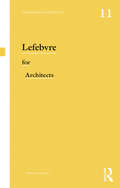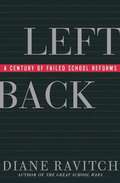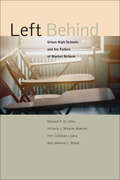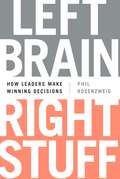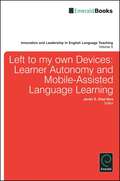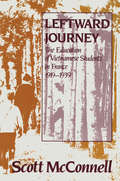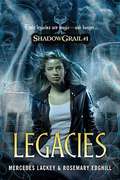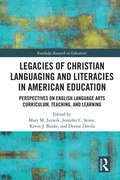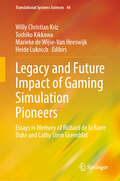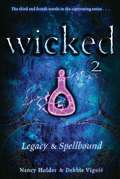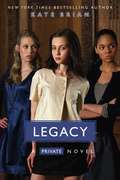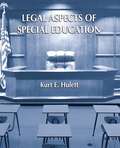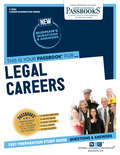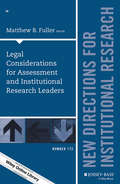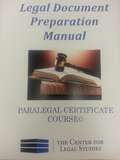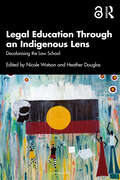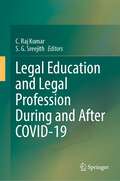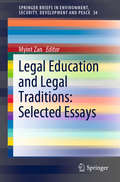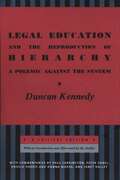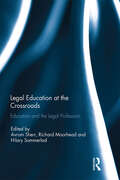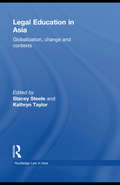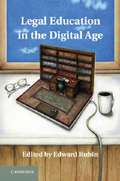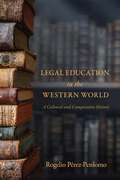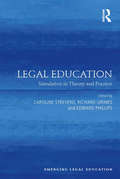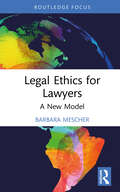- Table View
- List View
Lefebvre for Architects (Thinkers for Architects)
by Nathaniel ColemanWhile the work of Henri Lefebvre has become better known in the English-speaking world since the 1991 translation of his 1974 masterpiece, The Production of Space, his influence on the actual production of architecture and the city has been less pronounced. Although now widely read in schools of architecture, planning and urban design, Lefebvre’s message for practice remains elusive; inevitably so because the entry of his work into the Anglosphere has come with repression of the two most challenging aspects of his thinking: romanticism and Utopia, which simultaneously confront modernity while being progressive. Contemporary discomfort with romanticism and Utopia arguably obstructs the shift of Lefebvre’s thinking from being objects of theoretical interest into positions of actually influencing practices. Attempting to understand and act upon architecture and the city with Lefebvre but without Utopia and romanticism risks muting the impact of his ideas. Although Utopia may seem to have no place in the present, Lefebvre reveals this as little more than a self-serving affirmation that ‘there is no alternative’ to social and political detachment. Demanding the impossible may end in failure but as Lefebvre shows us, doing so is the first step towards other possibilities. To think with Lefebvre is to think about Utopia, doing so makes contact with what is most enduring about his project for the city and its inhabitants, and with what is most radical about it as well. Lefebvre for Architects offers a concise account of the relevance of Henri Lefebvre’s writing for the theory and practice of architecture, planning and urban design. This book is accessible for students and practitioners who wish to fully engage with the design possibilities offered by Lefebvre’s philosophy.
Left Back: A Century of Failed School Reforms
by Diane RavitchFor the past one hundred years, Americans have argued and worried about the quality of their schools. Some have charged that students were not learning enough, while others have complained that the schools were not in the forefront of social progress. In this authoritative history of education in the twentieth century, historian Diane Ravitch describes this ongoing battle of ideas and explains why school reform has so often failed. "Left Back" recounts grandiose efforts by education reformers to use the schools to promote social and political goals, even when they diminished the schools' ability to educate children. It shows how generations of reformers have engaged in social engineering, advocating such innovations as industrial education, intelligence testing, curricular differentiation, and life-adjustment education. These reformers, she demonstrates, simultaneously mounted vigorous campaigns against academic studies. "Left Back" charges that American schools have been damaged by three misconceptions. The first is the belief that the schools can solve any social or political problem. The second is the belief that only a po
Left Behind: Urban High Schools and the Failure of Market Reform
by Edward P. St. John Victoria J. Milazzo Bigelow Kim Callahan Lijana Johanna C. MasséUrban schools are falling short of preparing students for college.In Left Behind, a team of education scholars led by Edward P. St. John argues that American cities have been engaged for the past three decades in a radical—but failing—effort to transform general and vocational high schools into college preparatory institutions. By examining the educational reforms in four urban charter schools across the United States and four public high schools in New York City, Left Behind reveals how educators contend with the challenge of developing new courses while providing social support for students to build college-going cultures.The research shows that district schools struggle to comply with standards that leave little room to develop advanced thematic curricula and that charter schools have not succeeded in substantially raising student test scores. Many students who start in rigorous charter schools transfer back to public schools while both public and charter schools struggle to prepare their students for college-level work.Left Behind provides crucial insights into the troubling trajectory of public policy while offering teachers and administrators effective strategies for overcoming barriers.
Left Brain, Right Stuff: How Leaders Make Winning Decisions
by Phil RosenzweigLeft Brain, Right Stuff takes up where other books about decision making leave off. For many routine choices, from shopping to investing, we can make good decisions simply by avoiding common errors, such as searching only for confirming information or avoiding the hindsight bias. But as Phil Rosenzweig shows, for many of the most important, more complex situations we face-in business, sports, politics, and more-a different way of thinking is required. Leaders must possess the ability to shape opinions, inspire followers, manage risk, and outmaneuver and outperform rivals. Making winning decisions calls for a combination of skills: clear analysis and calculation-left brain-as well as the willingness to push boundaries and take bold action-right stuff. Of course leaders need to understand the dynamics of competition, to anticipate rival moves, to draw on the power of statistical analysis, and to be aware of common decision errors-all features of left brain thinking. But to achieve the unprecedented in real-world situations, much more is needed. Leaders also need the right stuff. In business, they have to devise plans and inspire followers for successful execution; in politics, they must mobilize popular support for a chosen program; in the military, commanders need to commit to a battle strategy and lead their troops; and in start-ups, entrepreneurs must manage risk when success is uncertain. In every case, success calls for action as well as analysis, and for courage as well as calculation. Always entertaining, often surprising, and immensely practical, Left Brain, Right Stuff draws on a wealth of examples in order to propose a new paradigm for decision making in synch with the way we have to operate in the real world. Rosenzweig’s smart and perceptive analysis of research provides fresh, and often surprising, insights on topics such as confidence and overconfidence, the uses and limits of decision models, the illusion of control, expert performance and deliberate practice, competitive bidding and new venture management, and the true nature of leadership.
Left to My Own Devices: Learner Autonomy and Mobile-Assisted Language Learning
by Javier E. Díaz-VeraThis book is the result of five years of intensive dedication to teaching innovation and curriculum development and offers a series of studies exploring how mobile technologies in particular, and mobile learning in general, may be used for second language teaching and learning in a wide variety of environments.
Leftward Journey: Education of Vietnamese Students in France
by Scott McConnellFirst Published in 2018. Routledge is an imprint of Taylor & Francis, an Informa company.
Legacies (Shadow Grail #1)
by Rosemary Edghill Mercedes LackeyAfter her family is killed, Spirit White is taken to Oakhurst Academy, a combination orphanage and school for those with magical powers, where she and her new friends investigate when students start mysteriously disappearing.
Legacies of Christian Languaging and Literacies in American Education: Perspectives on English Language Arts Curriculum, Teaching, and Learning (Routledge Research in Education)
by Kevin J. Burke Mary M. Juzwik Jennifer C. Stone Denise DávilaBecause spiritual life and religious participation are widespread human and cultural phenomena, these experiences unsurprisingly find their way into English language arts curriculum, learning, teaching, and teacher education work. Yet many public school literacy teachers and secondary teacher educators feel unsure how to engage religious and spiritual topics and responses in their classrooms. This volume responds to this challenge with an in-depth exploration of diverse experiences and perspectives on Christianity within American education. Authors not only examine how Christianity – the historically dominant religion in American society – shapes languaging and literacies in schooling and other educational spaces, but they also imagine how these relations might be reconfigured. From curricula to classroom practice, from narratives of teacher education to youth coming-to-faith, chapters vivify how spiritual lives, beliefs, practices, communities, and religious traditions interact with linguistic and literate practices and pedagogies. In relating legacies of Christian languaging and literacies to urgent issues including White supremacy, sexism and homophobia, and the politics of exclusion, the volume enacts and invites inclusive relational configurations within and across the myriad American Christian sub-cultures coming to bear on English language arts curriculum, teaching, and learning. This courageous collection contributes to an emerging scholarly literature at the intersection of language and literacy teaching and learning, religious literacy, curriculum studies, teacher education, and youth studies. It will speak to teacher educators, scholars, secondary school teachers, and graduate and postgraduate students, among others.
Legacy and Future Impact of Gaming Simulation Pioneers: Essays in Memory of Richard de la Barre Duke and Cathy Stein Greenblat (Translational Systems Sciences #44)
by Heide Lukosch Willy Christian Kriz Toshiko Kikkawa Marieke de Wijse-Van HeeswijkThis book is a tribute to two pioneers in the field of gaming simulation: Richard de la Barre Duke and Cathy Stein Greenblat. Duke was a professor of urban planning at the University of Michigan who introduced gaming simulation into urban planning and policy making in the early 1970s. With his 1974 book Gaming: The future&’s language, he proposed simulation games as a multilogue language for bringing different disciplines and stakeholders&’ perspectives together. He was co-founder of the International Simulation and Gaming Association (ISAGA). Cathy Stein Greenblat was a professor of sociology at Rutgers University, using gaming simulation education and health care beginning in the mid-1970s. She was editor in chief of the international journal Simulation & Gaming for many years. Duke and Greenblat worked together and authored several influential books, and both were honorary members of ISAGA until they passed away in 2022. The present book focuses on the past and actual scientific and practical impact of their work for design and development, facilitation and debriefing, evaluation, and research of simulation games. The book contains discussions and case examples of how their key concepts are still used and can be used in the future to have a social impact through gaming simulation. Furthermore, the book shows how their work and guiding simulation game design principles continue to inspire ongoing and future research in the context of dealing with complexity and to support social and environmental transition through gaming simulation- Included are interviews with the two pioneers and contributions of other outstanding experts about their work.
Legacy and Spellbound (Wicked #3 and #4)
by Nancy Holder Debbie ViguiéHolly Cathers is not the same person she was almost a year and a half ago. After discovering her connection to an ancient legacy of witches, Holly has accepted her destiny as a descendant of the House of Cahors. She is determined to end an inter-generational feud that has plagued her family for centuries. Holly will have to overcome unworldly obstacles as she battles to protect her loved ones -- including Jer, a member of the rival House of Deveraux and her one true love. A war of magical proportions is being waged, and Holly is at the center of it all. Lives will be lost, and sacrifices will have to be made....
Legacy: A Private Novel
by Kate BrianThe price of power... After Cheyenne Martin's death, everyone at Easton Academy is struggling to recover from yet another tragedy--especially the girls of Billings Hall. With Cheyenne gone, they need to elect a new leader. And who better than Reed Brennan, the ultimate Billings Girls? As the new Billings president, Reed suddenly has access to power she never imagined. Gossip is reported to her immediately, she has first dibs on everything from dining tables to dorm rooms, and Billings's most powerful alumnae are at her beck and call. So when Easton's students discover they're the only prep school on the East Coast not invited to this year's all-inclusive Legacy party, everyone turns to Reed to get them back on the list. Reed is the most powerful girl at Easton. She revels in her newfound status, but knows better than anyone that the Bilings leaders have a tainted legacy: Ariana was institutionalized, Noelle was expelled, and Cheyenne just died. History has a way of repeating itself at Easton, and now that Reed has everything she's ever wanted, she has everything to lose.
Legal Aspects Of Special Education
by Kurt E. HulettFor every course in Special Education Law and Education Law, or as a perfect supplement to any Educational Administration course, Legal Aspects of Special Education was written by a practitioner to help teachers, administrators, and advocates understand special education law in everyday language- without excessive legalese or extraneous case law. Different in many ways from other special education law texts on the market, all of the elements of this text are intended to help its students obtain the most critical information about special education law and how it is applied in the real world. Some unique features include: a fascinating opening interview and then epilogue with Joe Ballard, a pioneer of the IDEA movement; a discussion of Response-to-Intervention (RTI) and the implication of IDEA 2004 for school districts; and a discussion of the history of special education and its link to the Civil Rights Movement. Additionally, the book provides case studies and application questions, critical thinking questions, the most current information on the laws including No Child Left Behind and the Individuals with Disabilities Education Act of 2004, and a discussion of major trends changing the laws, including that of autism.
Legal Careers: Passbooks Study Guide (Career Examination Series #C-1343)
by National Learning CorporationThe Legal Careers Passbook® prepares you for your test by allowing you to take practice exams in the subjects you need to study. It provides hundreds of questions and answers in the areas that will likely be covered on your upcoming exam, including but not limited to: Preparing, understanding, and interpreting written material; Legal Research; and more.
Legal Considerations for Assessment and Institutional Research Leaders: New Directions for Institutional Research, Number 172 (J-B IR Single Issue Institutional Research)
by Matthew B. FullerWhat can an institutional research leader do to ensure their unique roles do not place them or their institution in a legally challenging situation? In this monograph, IR practitioners, legal counselors, and scholars combine their expertise to examine unique legal challenges IR professionals face, offering guidelines for operating within legal boundaries and sustaining effective IR practices. Topics covered in this volume include: using legal precedents and law as a framework for guiding practice and policies; the latest on FERPA; dealing with security breaches; a review of employment, discrimination, harassment, intellectual property, and export control laws; recommendations for limiting liability; and how accreditation may change from voluntary to a contractual or even constitutional protections effort. This is the 172nd volume of this Jossey-Bass quarterly report series. Timely and comprehensive, New Directions for Institutional Research provides planners and administrators in all types of academic institutions with guidelines in such areas as resource coordination, information analysis, program evaluation, and institutional management.
Legal Document Preparation Manual: FOR PARALEGAL CERTIFICATE COURSE©
by Scott A. HatchThis book is designed to be used in conjunction with the Paralegal Certificate Course' and other paralegal studies courses to quickly and efficiently prepare paralegals. The notes and samples are designed to reinforce course lesson materials, and to help the student learn to apply the concepts and practical skills necessary for a successful paralegal career. Please note that any examples provided are for instructional purposes only and may not reflect proper formatting guidelines for all jurisdictions. As always, check your local rules of court for exact document specifications and filing requirements.
Legal Education Through an Indigenous Lens: Decolonising the Law School
by Heather Douglas Nicole WatsonThis book provides a comprehensive resource for accommodating and pursuing Indigenous perspectives in legal education.The book is divided into three sections. The first section highlights the continuing issues that Indigenous people face in law schools and universities, including the ongoing impacts of colonisation and intergenerational trauma, institutional racism and exclusion. This section also includes chapters that explore arguments for the recognition of Indigenous legal knowledge and of the impact of settler law, and the incorporation of Indigenous concepts, laws and ways of thinking about settler law across the curriculum. The second section explores how Indigenous ways of reading and thinking about settler law make a difference to how settler law is understood and interpreted. Contributors consider the power of storytelling and address the prospect of law’s decolonisation. The third section of the book grapples with how traditional law school subjects can be taught through an Indigenous lens, including torts, public law, criminal law and sentencing, clinical legal education, and native title. Throughout, the book demonstrates the importance of, and offers practical advice for, teaching law in a way that includes critical Indigenous perspectives.This book will be of enormous value to teachers, researchers, students in law, legal studies and Indigenous studies, and others with an interest in decolonising legal education.The Open Access version of this book, available at www.taylorfrancis.com, has been made available under a Creative Commons Attribution-Non Commercial-No Derivatives (CC-BY-NC-ND) 4.0 license.
Legal Education and Legal Profession During and After COVID-19
by C. Raj Kumar S. G. SreejithThis edited volume records the amazing transformations brought about by leaders in legal education and legal profession. It captures experiences and experiments in the governance of law schools and legal profession during the COVID-19 pandemic as case studies; ideas which helped in resilience and which could show the way forward; the psychological, philosophical, and sociological aspects of the transformation; and the spiritual and material sources of motivation of the leadership. The contributions are along the following themes --- The shifting idea of law school: systems and processes; The “new normal” in legal profession; Psychological, philosophical, and sociological aspects of transformation; Experiences from global regions and countries; Legal education and legal profession in a post-COVID world. Through these five themes, and the eighteen contributions, the volume seeks to answer questions like --- how the educational and professional leaders adapted to the circumstances by building a “new normal”? How and to what extent their own legal education and professional experiences informed their actions during the Pandemic? How they re-imagined ambitions and reordered systems and processes? What type of guidance and support they received from the state and regulatory bodies? How they guaranteed the well-being of students, faculty, and staff during the Pandemic and the transition? How they upheld professional values and ethics when contexts of their application collapsed?
Legal Education and Legal Traditions: Selected Essays (SpringerBriefs in Environment, Security, Development and Peace #34)
by Myint ZanThis book deals with aspects of legal education and legal traditions. Part I includes chapters on teaching Law of the Sea, legal ethics and educating lawyers as ‘transaction cost engineers’ as well as comparison of teaching law in a refugee camp and in a Malaysian University. Part II on legal and philosophical traditions includes essays on what later philosophers would have commented on Plato’s arguments in the Crito regarding ‘absolute obligation to obey the law’ and what Socrates would have said on two conversations in the 19th century novel Uncle Tom’s Cabin regarding the morality and legality of harbouring runaway slaves. Part II concludes with two essays regarding the applicability of the Hart-Devlin debate on the ‘enforcement of morals’ vis-à-vis the International Criminal Court and an essay on what the historian Arnold Toynbee would have commented on the ‘contingency’ v ‘teleology’ debate between two palaeontologists the late Stephen Jay Gould and Simon Conway Morris.• Legal education of interest to legal educators and students • Legal, political, moral philosophy as well as philosophy of history of interest to law, philosophy and history teachers, postgraduate and under graduate students• Aspects of legal ethics for law teachers, students and legal professionals• Interdisciplinary studies regarding law and economics, law and literature, law and social justice for law, humanities, social science academics and students.
Legal Education and the Reproduction of Hierarchy: A Polemic Against the System (Critical America #56)
by Duncan KennedyIn 1983 Harvard law professor Duncan Kennedy self-published a biting critique of the law school system called Legal Education and the Reproduction of Hierarchy. This controversial booklet was reviewed in several major law journals—unprecedented for a self-published work—and influenced a generation of law students and teachers. In this well-known critique, Duncan Kennedy argues that legal education reinforces class, race, and gender inequality in our society. However, Kennedy proposes a radical egalitarian alternative vision of what legal education should become, and a strategy, starting from the anarchist idea of workplace organizing, for struggle in that direction. Legal Education and the Reproduction of Hierarchy is comprehensive, covering everything about law school from the first day to moot court to job placement to life after law school. Kennedy's book remains one of the most cited works on American legal education.The visually striking original text is reprinted here, making it available to a new generation. The text is buttressed by commentaries by five prominent legal scholars who consider its meaning for today, as well as by an introduction and afterword by the author that describes the context in which Kennedy wrote the book, including a brief history of critical legal studies.
Legal Education at the Crossroads: Education and the Legal Profession
by Richard Moorhead Hilary Sommerlad Avrom SherrFor several years legal professions across the world have, to varying degrees, been undergoing dramatic changes as a result of a range of forces such as globalization, diversification and changes in regulation. In many jurisdictions the extent of these transformations have led to a process of professional fragmentation and generated uncertainty at institutional, organisational and individual levels about the nature and future of legal professionalism. As a result legal education is in flux in many of jurisdictions including the United States, the UK and Australia, with further effects in other Common Law and some Civil law countries. The situation in the UK exemplifies the sense of uncertainty and crisis, with a growing number of pathways into law; an increasing surplus of law graduates to graduate entry positions and most recently proposals for reform of legal education and training by the Solicitors Regulation Authority (SRA). This collection addresses both current and historical approaches showing that some problems which appear to be modern are endemic, that there are still some important prospects for change and that policy issues may be more important than the interests of lawyers and educators. This makes this volume a source of interest to lawyers, law students, academic and policy makers as well as the discerning public. This book was previously published as a special issue of the International Journal of the Legal Profession.
Legal Education in Asia: Globalization, Change and Contexts (Routledge Law in Asia)
by Kathryn Taylor Stacey SteeleLegal education is undergoing rapid change throughout Asia. This book is a critique of the changing nature of legal education in major Asian jurisdictions as diverse as Afghanistan, Australia, Cambodia, the People’s Republic of China, Hong Kong, Indonesia, Japan, the Republic of Korea, Singapore, Taiwan and Vietnam. It provides cross-country comparative material, including Western legal education systems, and particularly detailed coverage of Japan, whose legal education system has been used by many other countries in Asia as a model to imitate. Despite the diverse histories, societies, traditions and political and economic situations of these countries, they all share common themes of change, renewal and reform in their legal education systems. The jurisdictions also generally tend to be embracing globalisation, despite (or in some instances because of) the association of globalisation with other movements, such as the development of market economies and neo-liberal ideals. This is the first significant collection available in English on the subject of pre-qualification legal education in Asia, providing a valuable multi-jurisdictional tool for academics and students of Asian legal studies, law reformers, governance experts, development practitioners and lawyers working in the region.
Legal Education in the Digital Age
by Edward RubinDuring the coming decades, the digital revolution that has transformed so much of our world will transform legal education as well. The digital production and distribution of course materials will powerfully affect both the content and the way materials are used in the classroom and library. This collection of essays by leading legal scholars in various fields explores three aspects of this coming transformation. The first set of essays discusses the way digital materials will be created and how they will change concepts of authorship as well as methods of production and distribution. The second set explores the impact of digital materials on law school classrooms and law libraries, and the third set considers the potential transformation of the curriculum that the materials are likely to produce. Taken together, these essays provide a guide to momentous changes that every legal teacher and scholar needs to understand.
Legal Education in the Western World: A Cultural and Comparative History
by Rogelio Pérez-PerdomoLegal Education in the Western World provides an encompassing history of legal education from Ancient Rome to present day Europe and the Americas. Legal education is considered the locus of the formation of professional culture, and in this book Rogelio Pérez-Perdomo contributes to our understanding of its formation by paying attention to how legal knowledge is conceived, the way it is created and transmitted, and the social status of masters, professors, teachers, apprentices and students. He focuses on historical periods and societies that have influenced the current state of legal education. While these are established touchpoints used by historians and supported by a vast bibliographies in English, Spanish, French, Italian and Portuguese, this book also includes material often overlooked by historians. Ultimately, this concise and accessible history presents a panoramic view that highlights the strengths and weaknesses of approaches to legal education in different societies, and an examination of the shared idea of law manifested in them. This historical and comparative perspective will be useful to comparative legal scholars and legal historians interested in a more informed general approach to improving legal education.
Legal Education: Simulation in Theory and Practice (Emerging Legal Education)
by Richard Grimes Edward Phillips Caroline StrevensThe importance of simulation in education, specifically in legal subjects, is here discussed and explored within this innovative collection. Demonstrating how simulation can be constructed and developed for learning, teaching and assessment, the text argues that simulation is a pedagogically valuable and practical tool in teaching the modern law curriculum. With contributions from law teachers within the UK, Australia, Hong Kong, South Africa and the USA, the authors draw on their experiences in teaching law in the areas of clinical legal education, legal process, evidence, criminal law, family law and employment law as well as teaching law to non-law students. They claim that simulation, as a form of experiential and problem-based learning, enables students to integrate the ’classroom’ experience with the real world experiences they will encounter in their professional lives. This book will be of relevance not only to law teachers but university teachers generally, as well as those interested in legal education and the theory of law.
Legal Ethics for Lawyers: A New Model (Routledge Research in Legal Philosophy)
by Barbara MescherThis book proposes a new model of professional ethics enabling lawyers to advise clients upon both the law and ethics. This will better protect clients, and society, and enhance lawyers’ professional obligations. The current model of legal ethics, developed in the 19th century, specified that the role of lawyers was only to interpret the law, not also to give ethical advice. This was acceptable to lawyers, clients, and society at that time. However, this is not the case now and legal ethics no longer reflects the needs of modern legal practice. This book draws on moral philosophy to present a new model of legal ethics that explains the analytical process to include ethical advice. It analyses the potential harm of the present model to the legal profession who have duties to the law and justice that may compete with demands by clients to serve them. Further, lawyers’ duty to clients to act in their best interests is sometimes not adequately fulfilled as legal ethics does not permit lawyers to give ethical advice even if it may be in clients’ best interests to do so. The work includes a detailed case study of corporate law practice to show why a new legal ethics is required. Other case examples are provided to demonstrate that lawyers practicing in all areas of law encounter ethical issues and they too will benefit from a new legal ethics. The book will be essential reading for students, academics, lawyers and professional bodies.
